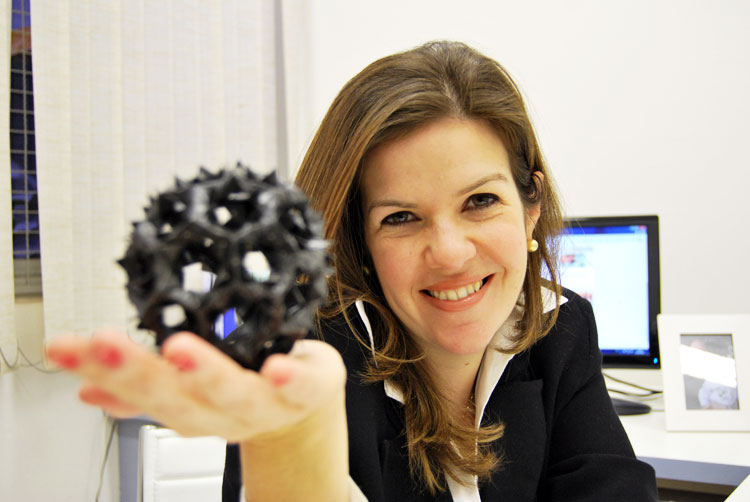Professor Ana Flávia Nogueira
Ana Flavia obtained her BSc Degree in Chemistry from the University of São Paulo in 1996. After that, she joined the group of Prof. Marco-Aurelio De Paoli at University of Campinas (UNICAMP). Her Master and PhD thesis involved the study and application of polymer electrolytes in Dye Sensitized Solar Cells. Her PhD thesis was the first one in the area of Gratzel´s solar cells in Brazil. She obtained the Master and PhD degree in 1998 and 2001, respectively.
During her PhD, she joined the group of Prof. James R. Durrant at Imperial College in London. During the “sandwich” program, she investigated the dynamics of dye sensitized solar cells using polymer electrolytes by transient absorption spectroscopy. After finishing her PhD, she returned to Durrant´s group, but this time to investigate charge recombination in organic solar cells by transient techniques. This post-doc had the collaboration of Prof. N. Serdar Sariciftci from Johannes Kepler University, Linz, Austria. In 2003, she returned to Brazil and joined the group of Prof. Henrique E. Toma at the University of São Paulo to apply supramolecular chemistry to Gratzel´s solar cells. In 2017, Ana Flavia was visiting scholar at Stanford University, working in collaboration with Prof. Michael F. Toney in the use of synchrotron radiation in metal halide perovskite’s characterization.
Ana Flavia is Full Professor in the Chemistry Institute at UNICAMP and Director of the Center for Innovation on New Energies (CINE – www.cine.org.br). She has experience in the field of chemistry, with emphasis in nanostructured materials and their application in solar energy conversion. The main research focuses on the development of metal halide perovskite solar cells, perovskite quantum materials and dense energy carriers (generation of solar fuels through photoelectrocatalytic systems using water, CO2 and other low-added values substrates).
She has published more than 195 papers, seven book chapters, one book and 3 patents. The Laboratório de Nanotecnologia e Energia Solar (LNES) was founded in 2005. The group has the leadership in dye sensitized, organic solar cells and perovskite solar research in Brazil and Latin America. In 2020 she was awarded with the ACS Leadership in Academia Award. Fellow of Royal Society of Chemistry and Member of the Brazilian Academy of Science. She is also an associate editor for the Journal of Materials Chemistry C and Materials Advances.

